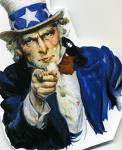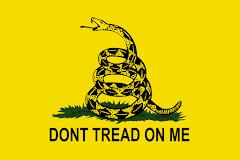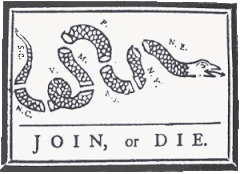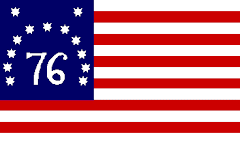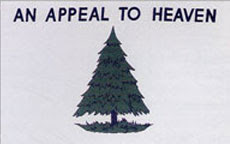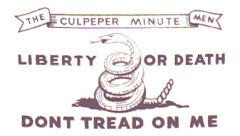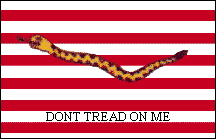My Dear Fellow Patriots;
At one point during Tuesday night's debate at Wagner College, incumbent Michael McMahon smugly told challenger Michael Grimm that he was going to "school him." By the time it was all over, however, it became clear that it was McMahon who needed to learn a few things.
I arrived early. Outside the doors of Main Hall, a beautiful old building, dramatically lit, were a few hundred people holding McMahon signs - and virtually nobody displaying Grimm signs. Apparently the Congressman's campaign staff did a much better job of whipping up the volunteers than did the Grimm folks - at least, that's what I thought. Not an auspicious start.
Then I noticed that all the men in the crowd who were over the age of a typical college sophomore, were wearing matching shirts - crisp, new, white sweatshirts. Remembering what I was taught by never-ending commercials, I looked for the union label - and sure enough, emblazoned on the back was the logo of a labor organization which I shall not name. Those that were not wearing the sweatshirts were, well, college sophomores.
It was quite clear that this was an Astro Turf crowd; it was also quite clear that the McMahon camp had put a lot of effort into ginning up enthusiasm for their candidate. Unfortunately, they had to settle for manufactured sizzle. Truthfully, when you see all those robotic zombie-types dressed alike and taking orders from their leaders ("OK, everybody walk over here!") it smacks more of desperation than anything else.
Inside the theater we took the first empty seats on the aisle we could find - in about the ninth or tenth row - which meant that about 80% of the room was behind us.
At 7:30 the candidates walked in - McMahon first. As soon as he entered the room there was enthusiastic applause, and as he got closer to the stage virtually everybody sitting in front of me - all 8 or 9 rows - stood up and cheered. I thought it was going to be a long night with a packed McMahon crowd, until I turned around and saw that nobody behind me was standing, and only a scant handful was even applauding.
Then Grimm walked in and the room erupted. If this race was decided by an applause-meter, it would have been all over right then and there; if you were at the Healthcare Town Hall Meeting last October, it was deja vu all over again.
As for the debate itself, Grimm won handily, in my opinion. He spoke smoothly and confidently, hit all the right notes, came off as a regular guy with a passionate love of country and liberty, showed good humor, and scored multiple points.
He was obviously well-prepared. His poise and tone were quite remarkable when you consider that he has never been involved in politics in his life - another factor in his favor.
His biggest gaffe of the evening? In a question about immigration, he referred to "immigrants" when he obviously meant to refer to "illegal immigrants," and apparently didn't notice the slip. We all knew what he meant - it was quite obvious in the context of his remarks. McMahon, however, tried to pounce on him when it was his turn, pontificating about how this country was built on immigration. It was his "gotcha" moment, and hardly worthy of the mention.
However, McMahon's major gaffe was a beauty. During his response to the same question, and while defending the Administration's policy on illegals - which is to say, no policy at all - he stated that he supports deporting illegal aliens - if they commit a crime!
Mr. Grimm then pointed out that his opponent, the incumbent, might want to reflect upon the fact that "illegal" immigrants have by definition committed a crime the moment they crossed the border. Oops. Was his face red.
This is a horse race, my friends. McMahon and Grimm are driving down the stretch to the finish line; either one could win, and despite the Advance's attempt to marginalize the importance of this election (according to their editorial: "To hear some people around here talk, the fate of the republic hinges on the outcome of the election for the seat in the 13th Congressional District. Of course, all over the country, similarly outlandish claims are being made...") you and I know better: this year there are NO unimportant races. Let's make it happen.
Yours in Liberty,
Frank Santarpia
Staten Island, NY
Thursday, October 28, 2010
Saturday, October 23, 2010
On the second day. On a small hill.
My Dear Fellow Patriots:
In a few days our beloved Republic, the dream of our forefathers, will be saved – or it will be lost.
Seldom in its history has a battle been fought upon which the future of the country so soundly rests; never has its fate been more assuredly determined as it will be when the last polls close in the far western reaches of the United States of America on November 2, 2010.
The closest we’ve ever come to political extinction, to being just a noble experiment in democracy wherein free men were the rulers and not the ruled, was in July of 1863 - when the Army of the Republic came within a whisker of defeat at a bloody battle in a small Pennsylvania town called Gettysburg.
 There, on the second day of the three-day battle, on a small hill that came to be called Little Round Top, Colonel Joshua Chamberlain was tasked with defending the extreme left flank of the Union Army with a handful of men known as the 20th Maine Volunteer Infantry Regiment.
There, on the second day of the three-day battle, on a small hill that came to be called Little Round Top, Colonel Joshua Chamberlain was tasked with defending the extreme left flank of the Union Army with a handful of men known as the 20th Maine Volunteer Infantry Regiment.
They were citizen soldiers, barely trained, hardly battle-hardened, and could not have known when they enlisted that upon their simple shoulders would rest the fate of a nation, and because of their courage, and their courage only, a nation would endure.
Politics played no less a role in America in the 1860’s than it does today; support for the war in the North was waning as the Union Army was dealt a series of stinging defeats; now, the Army of Northern Virginia, led by the seemingly invincible Robert E. Lee, had advanced further north than at any time since the war’s inception, and defeat in Pennsylvania would put Philadelphia, Baltimore and even Washington, D.C. in jeopardy. Fear was spreading; panic was waiting in the wings. A defeat here would force Lincoln much closer to a compromise with the Confederacy, and the very real possibility of military disaster loomed. It was not a far stretch to say that the preservation of the Union was at stake.
So it was that on June 30, 1863, one of Lee’s officers sent a foraging party into that small crossroads town – in search of shoes. And because upon such tiny hinges do the doors of world-historical events open and shut, the Rebels spied elements of Union cavalry arriving south of town, and reported back to their commanding officer, General A.P. Hill. Hill decided to send a reconnaissance-in-force, about two brigades, into the town the next day, to see if he was dealing with nothing more than a troublesome Pennsylvania militia, or perhaps something else - something unexpected.
It would require a great deal of time, space and most importantly research, to properly recount the events of July 1st, 1863 in the ridges and hills west of Gettysburg, and those events are not to the purpose of this writing. What happened the following day is, because it illustrates how a small band of determined men, armed with little more than a belief in their cause, rose up to defend the nation and Constitution in which they so firmly believed.
 That Thursday morning the Union army, under General George Meade, found themselves strung out in a defensive position along a line of high ground ominously known as Cemetery Ridge. They faced west, and the ridge was anchored on the southern end, their left flank, by Little Round Top, where the defensive line was arrayed in such a way as to resemble a fishhook. The last element at the end of that hook was the 20th Maine. Should they be dislodged from that position, the entire Union line could be rolled up and occupied by the Confederates, and it is unlikely that they would ever be removed. A loss at Gettysburg, and the history of this nation would be forever altered.
That Thursday morning the Union army, under General George Meade, found themselves strung out in a defensive position along a line of high ground ominously known as Cemetery Ridge. They faced west, and the ridge was anchored on the southern end, their left flank, by Little Round Top, where the defensive line was arrayed in such a way as to resemble a fishhook. The last element at the end of that hook was the 20th Maine. Should they be dislodged from that position, the entire Union line could be rolled up and occupied by the Confederates, and it is unlikely that they would ever be removed. A loss at Gettysburg, and the history of this nation would be forever altered.
 Starting at 4:00 PM, the rebels pounded away at that left flank, led by the 15th Alabama. Over and over they charged up that hill, and over and over they were repulsed by blistering fire from the 20th on the Union flank; so thick was the shot that the tens of thousands of rounds of Minie balls cut down swaths of trees – and swaths of men fighting and dying for their cause. Death did not choose a side.
Starting at 4:00 PM, the rebels pounded away at that left flank, led by the 15th Alabama. Over and over they charged up that hill, and over and over they were repulsed by blistering fire from the 20th on the Union flank; so thick was the shot that the tens of thousands of rounds of Minie balls cut down swaths of trees – and swaths of men fighting and dying for their cause. Death did not choose a side.
After ninety minutes, the 20th Maine was worn out, and worse, without ammunition. But still there was fight in them – still they would refuse to surrender the cause. Knowing that they could not withstand another assault, with desperation the word went up and down the line, which had now been stretched to single file along the prow of the hill: “Fix bayonets!”
In one of the most improbable counter-attacks in the history of the United States military, the 20th Maine charged down the hill towards the Rebel line without bullets: armed with nothing but raw courage and sharp steel. As shocking as the charge was to the enemy, equally shocking was the result – the Confederates could not withstand the surprise attack, and slowly, then more quickly, began to give ground. It turned into a rout, and by daybreak the stage had been set for the final act in the battle that changed the course of the war.
Unable to dislodge the Union army from the left flank of the line, Lee decided that on the third day he would attack the center, in a desperate winner-take-all gambit. The charge would be led, with pride, by General George Edward Pickett.
We all know the outcome.I wish we knew the outcome of the battle that will be fought on the first Tuesday of November - but we do not. Like the 20th Maine. we are running low on ammunition; like the 20th Maine, we face a determined foe; and like the 20th Maine, we refuse to lose.
We refuse to allow those who would attack our freedoms and our Constitution to take the high ground. We refuse to become discouraged, to lose heart, to succumb to the relentless attack on our beliefs. We, like the 20th Maine, must find the courage and determination to rise up, to exhort our neighbors to join our common cause as if the fate of the Republic were at stake - because it just might be.
The battle is in scant days. Fix bayonets.
Yours in Liberty,
Frank Santarpia
Staten Island, NY
In a few days our beloved Republic, the dream of our forefathers, will be saved – or it will be lost.
Seldom in its history has a battle been fought upon which the future of the country so soundly rests; never has its fate been more assuredly determined as it will be when the last polls close in the far western reaches of the United States of America on November 2, 2010.
The closest we’ve ever come to political extinction, to being just a noble experiment in democracy wherein free men were the rulers and not the ruled, was in July of 1863 - when the Army of the Republic came within a whisker of defeat at a bloody battle in a small Pennsylvania town called Gettysburg.
 There, on the second day of the three-day battle, on a small hill that came to be called Little Round Top, Colonel Joshua Chamberlain was tasked with defending the extreme left flank of the Union Army with a handful of men known as the 20th Maine Volunteer Infantry Regiment.
There, on the second day of the three-day battle, on a small hill that came to be called Little Round Top, Colonel Joshua Chamberlain was tasked with defending the extreme left flank of the Union Army with a handful of men known as the 20th Maine Volunteer Infantry Regiment.They were citizen soldiers, barely trained, hardly battle-hardened, and could not have known when they enlisted that upon their simple shoulders would rest the fate of a nation, and because of their courage, and their courage only, a nation would endure.
Politics played no less a role in America in the 1860’s than it does today; support for the war in the North was waning as the Union Army was dealt a series of stinging defeats; now, the Army of Northern Virginia, led by the seemingly invincible Robert E. Lee, had advanced further north than at any time since the war’s inception, and defeat in Pennsylvania would put Philadelphia, Baltimore and even Washington, D.C. in jeopardy. Fear was spreading; panic was waiting in the wings. A defeat here would force Lincoln much closer to a compromise with the Confederacy, and the very real possibility of military disaster loomed. It was not a far stretch to say that the preservation of the Union was at stake.
So it was that on June 30, 1863, one of Lee’s officers sent a foraging party into that small crossroads town – in search of shoes. And because upon such tiny hinges do the doors of world-historical events open and shut, the Rebels spied elements of Union cavalry arriving south of town, and reported back to their commanding officer, General A.P. Hill. Hill decided to send a reconnaissance-in-force, about two brigades, into the town the next day, to see if he was dealing with nothing more than a troublesome Pennsylvania militia, or perhaps something else - something unexpected.
It would require a great deal of time, space and most importantly research, to properly recount the events of July 1st, 1863 in the ridges and hills west of Gettysburg, and those events are not to the purpose of this writing. What happened the following day is, because it illustrates how a small band of determined men, armed with little more than a belief in their cause, rose up to defend the nation and Constitution in which they so firmly believed.
 That Thursday morning the Union army, under General George Meade, found themselves strung out in a defensive position along a line of high ground ominously known as Cemetery Ridge. They faced west, and the ridge was anchored on the southern end, their left flank, by Little Round Top, where the defensive line was arrayed in such a way as to resemble a fishhook. The last element at the end of that hook was the 20th Maine. Should they be dislodged from that position, the entire Union line could be rolled up and occupied by the Confederates, and it is unlikely that they would ever be removed. A loss at Gettysburg, and the history of this nation would be forever altered.
That Thursday morning the Union army, under General George Meade, found themselves strung out in a defensive position along a line of high ground ominously known as Cemetery Ridge. They faced west, and the ridge was anchored on the southern end, their left flank, by Little Round Top, where the defensive line was arrayed in such a way as to resemble a fishhook. The last element at the end of that hook was the 20th Maine. Should they be dislodged from that position, the entire Union line could be rolled up and occupied by the Confederates, and it is unlikely that they would ever be removed. A loss at Gettysburg, and the history of this nation would be forever altered. Starting at 4:00 PM, the rebels pounded away at that left flank, led by the 15th Alabama. Over and over they charged up that hill, and over and over they were repulsed by blistering fire from the 20th on the Union flank; so thick was the shot that the tens of thousands of rounds of Minie balls cut down swaths of trees – and swaths of men fighting and dying for their cause. Death did not choose a side.
Starting at 4:00 PM, the rebels pounded away at that left flank, led by the 15th Alabama. Over and over they charged up that hill, and over and over they were repulsed by blistering fire from the 20th on the Union flank; so thick was the shot that the tens of thousands of rounds of Minie balls cut down swaths of trees – and swaths of men fighting and dying for their cause. Death did not choose a side.After ninety minutes, the 20th Maine was worn out, and worse, without ammunition. But still there was fight in them – still they would refuse to surrender the cause. Knowing that they could not withstand another assault, with desperation the word went up and down the line, which had now been stretched to single file along the prow of the hill: “Fix bayonets!”
In one of the most improbable counter-attacks in the history of the United States military, the 20th Maine charged down the hill towards the Rebel line without bullets: armed with nothing but raw courage and sharp steel. As shocking as the charge was to the enemy, equally shocking was the result – the Confederates could not withstand the surprise attack, and slowly, then more quickly, began to give ground. It turned into a rout, and by daybreak the stage had been set for the final act in the battle that changed the course of the war.
Unable to dislodge the Union army from the left flank of the line, Lee decided that on the third day he would attack the center, in a desperate winner-take-all gambit. The charge would be led, with pride, by General George Edward Pickett.
We all know the outcome.I wish we knew the outcome of the battle that will be fought on the first Tuesday of November - but we do not. Like the 20th Maine. we are running low on ammunition; like the 20th Maine, we face a determined foe; and like the 20th Maine, we refuse to lose.
We refuse to allow those who would attack our freedoms and our Constitution to take the high ground. We refuse to become discouraged, to lose heart, to succumb to the relentless attack on our beliefs. We, like the 20th Maine, must find the courage and determination to rise up, to exhort our neighbors to join our common cause as if the fate of the Republic were at stake - because it just might be.
The battle is in scant days. Fix bayonets.
Yours in Liberty,
Frank Santarpia
Staten Island, NY
Saturday, October 16, 2010
Thursday, October 14, 2010
Wednesday, October 6, 2010
Subscribe to:
Posts (Atom)
